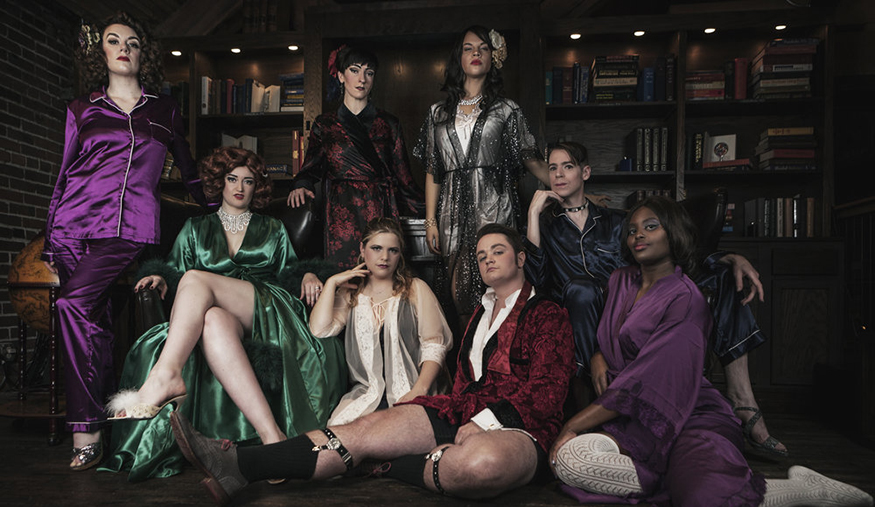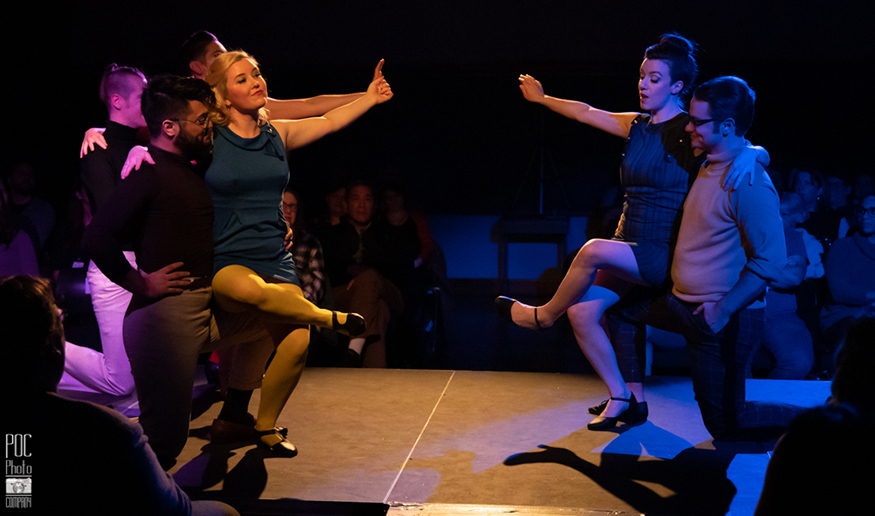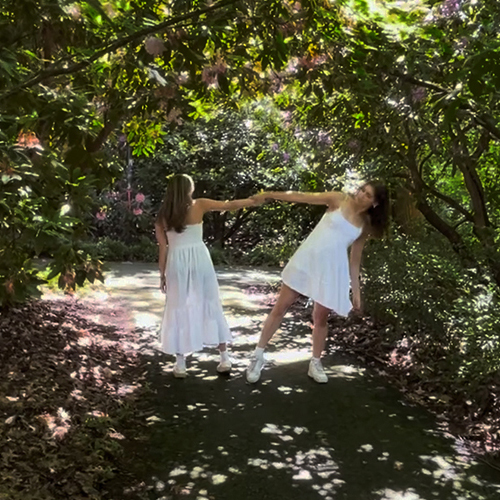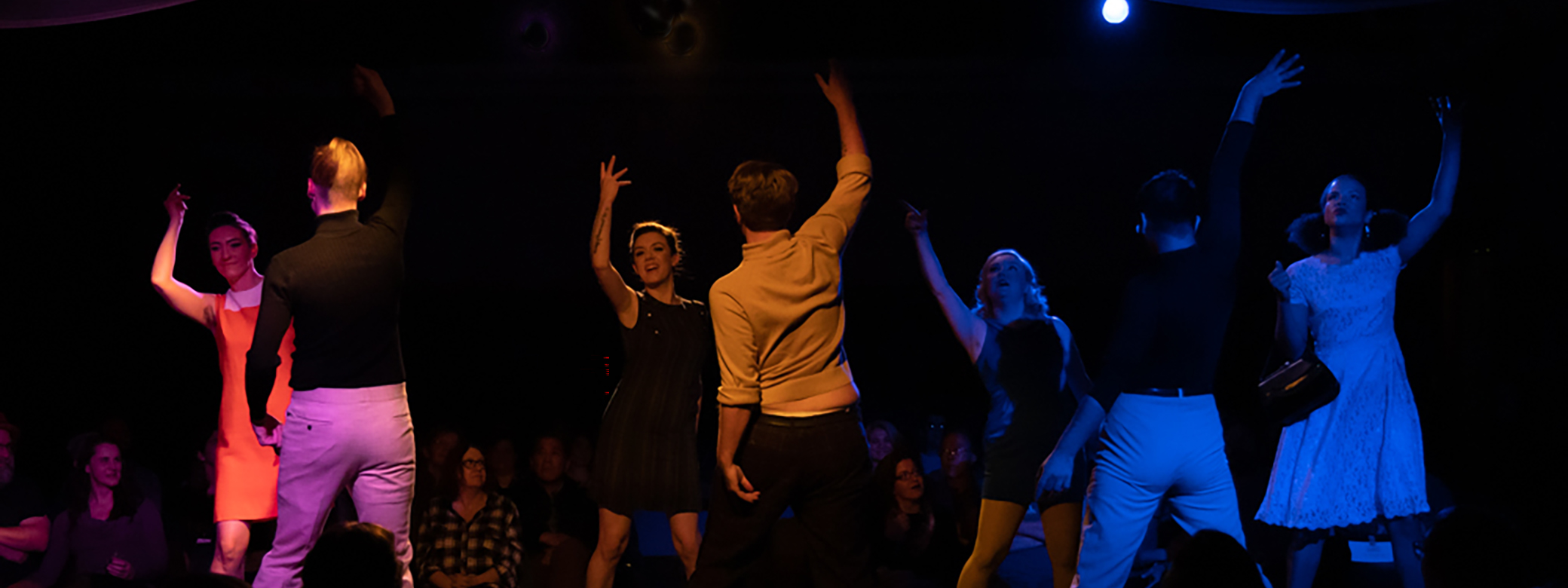
Ask Stevi Costa about an American novel from the past two centuries, and she’s probably read it. Mention a classic from an earlier period — The Odyssey, a Shakespeare play — and she’s likely read that too.
Costa’s passion for literature led her to a UW PhD in English. It also led her to celebrate literature through burlesque performances. Costa is the co-founder of Noveltease Theatre, which adapts classic works of theater and literature from a sex-positive, queer, feminist, and anti-racist standpoint through burlesque.
Founded in 2019, Noveltease has already tackled such classics as Canterbury Tales, The Odyssey, Jane Austen’s Northanger Abbey, Rudolph Erich Raspe’s The Marvelous Tales of the Baron Munchausen, and Dorothy Scarborough’s The Wind. Next up is Sherlock Holmes, opening October 20.
Back to the Roots of Burlesque
When burlesque was introduced in the US in the 1880s — an import from England — the shows were theater productions with scantily clad women playing all the roles in classical dramas. “They were acting and showing parts of their bodies that might be considered funny or titillating to enhance the social commentary and satire,” says Costa. Those theater performances were soon replaced with more commercial review-style shows with dancing chorus girls. Then came vaudeville and strip shows.
Dance and burlesque are so much about using the body to express things you can’t actually say with words.
Noveltease is a return to the theatrical roots of burlesque, with classical works for inspiration. Costa looks for stories in which burlesque can serve a purpose. Canterbury Tales, full of ribald stories, was an easy choice. More generally, Costa finds that burlesque’s emphasis on dance adds nuance to stories.
“Dance and burlesque are so much about using the body to express things you can’t actually say with words,” she says. “Adding dance and burlesque in these adaptations — from bump-and-grind from the 1940s and 1950s to more modern or lyrical versions of burlesque — helps express all of the beautiful third-person omniscient narration that a character can’t speak out loud. We’ll often insert a dance piece where we want to make some kind of subtext clear.”
Inspired by Books
Costa’s dedication to bringing literature to the stage reflects her lifelong love of reading. As a child, “books were the one thing my mom said I could have as many of as I wanted,” she recalls. In high school and college, Costa also dabbled in theater.
After earning a BA in English and linguistics at UC Santa Barbara, Costa worked as a business reporter in California before returning to academia as a graduate student in the UW Department of English. “I really missed the idea of deep study,” she says. At the UW, she became intrigued by 19th-century American literature, especially books that referenced the stage.

“I was invested in theater, and I was interested in how the human body was presented in literature,” she says. “So when writers like Stephen Crane and Frank Norris and William Dean Howells wrote explicit scenes where people were going to the theater and watching performances happen, I found those scenes really interesting.”
It was also during graduate school that Costa discovered burlesque. At the time, most burlesque productions in Seattle consisted of a series of solo acts. The simplicity of that appealed to her.
“The great thing about burlesque is that it takes all the things I love about theater — the act of embodying a character and creating a performance — but with so much less rehearsal time because it’s typically an individual act,” says Costa. “Of course, then I went ahead and made it much harder for myself and a lot more like theater by creating Noveltease, where we are doing fully scripted theatrical productions.”
A Successful Collaboration
Even before Noveltease, Costa’s solo performances were inspired by books. There was a character from Frank Norris’s McTeague, one of Costa’s favorite novels, and a piece embodying Mary Shelley, inspired by a line from Shelley’s introduction to Frankenstein. Beyond solo work, Costa presented The Tennessee Tease, based on scenes from Tennessee Williams plays, in collaboration with a friend who goes by the stage name Fosse Jack.

Another literary collaboration with Fosse Jack followed, and before long the pair decided to formalize their partnership. In 2019 they founded Noveltease. The repertory company has a core group of eight performers, with others added as needed for specific productions. “The joy of that model is that as we continue to develop projects, we get to see these actors take on different roles over time,” says Costa — or Sailor St. Claire as she is known on stage.
Though burlesque is a mostly female art form, and most Noveltease performers identify as female or nonbinary, the roles they inhabit are rarely limited by gender identity. “We will cast pretty much anybody in any role, unless we explicitly feel a role needs to be played by a particular type of body,” says Costa.
That’s not to suggest that Noveltease ignores gender. The company puts a decidedly feminist spin on most literary works it adapts. “Sometimes the body of the actor can bring forth critical possibilities in the text,” Costa says, offering the example of Northanger Abbey. “The first line of the novel — and of our play — is ‘Cathy Morland was in training for a heroine.’ Typically, Austen heroines are cisgender white women, but our Cathy Morland was a nonbinary Afro-Latinx performer. We wanted to think about what it looks like to imagine a heroine as someone who isn’t cisgender and isn’t white. How would that play with and against the text to produce something new?”
Surviving COVID, Looking Ahead
Next for Noveltease is a production of Sherlock Holmes. It has been a long time coming. The show was set to open in spring 2020, but COVID nixed that plan. The company pivoted to a web series that featured individual burlesque acts performed at home. In early 2021, Noveltease pivoted again, producing The Odyssey as a film without an audience.

Then came Canterbury Tales, performed for a small audience — with proof of vaccination — but also filmed for those uncomfortable attending in person. Novelteases’s most recent production, The Wind, was the first in two years to be presented entirely in person.
Future seasons are already taking shape. The Count of Monte Cristo is planned for spring 2023 and Costa — who also works as a grants associate for Seattle Repertory Theatre — is working on an adaptation of Hamlet.
“In deciding on shows, we ask ourselves ‘Is it fun? Is it interesting? What role could burlesque play in explaining emotional subtext or fantasy or desire?’” says Costa.
She concedes that Hamlet might not fit the description of “fun.” But she sees possibilities.
“It’s got spooky ghosts and I think ghosts are great,” she says. “Using that as a supernatural element in burlesque — yeah, I’m really trying to figure that out.”
In a 2021 interview with C. R. Grimmer (right), Stevi Costa discusses Queer and Feminist burlesque as poetry, performs a reading, and shares her experiences performing with Noveltease Theatre. The interview was part of The Poetry Vlog, funded through the UW Simpson Center for the Humanities with support from The Andrew W. Mellon Foundation.
More Stories

Finding Family in Korea Through Language & Plants
Through her love of languages and plants — and some serendipity — UW junior Katie Ruesink connected with a Korean family while studying in Seoul.

Dancing Across Campus
For the dance course "Activating Space," students danced in public spaces across the University of Washington's Seattle campus this spring.

Read or Listen to Faculty Favorites
Looking for book or podcast recommendations? We asked faculty who've been featured in Perspectives newsletter during the past academic year to suggest a personal favorite.

